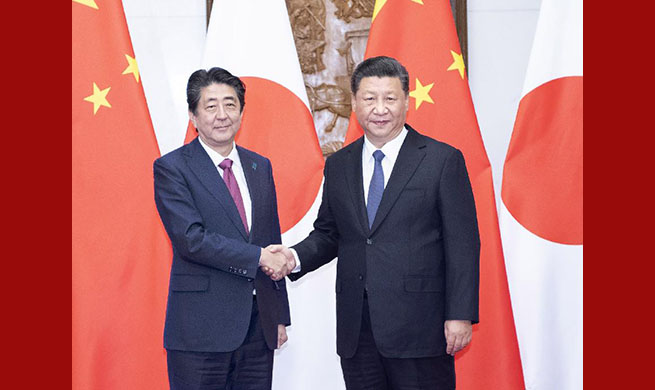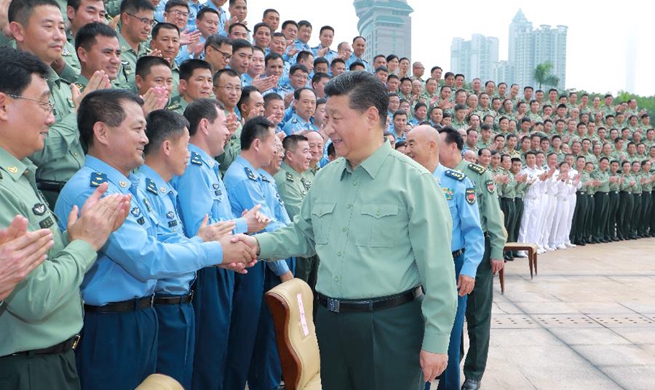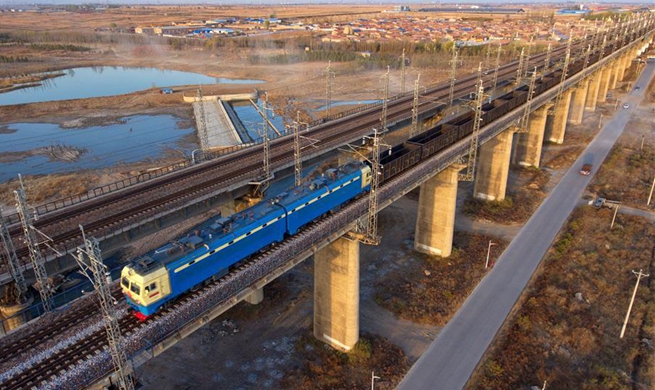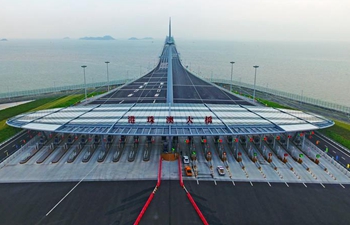by Nathan Morley
BRUSSELS, Oct. 26 (Xinhua) -- U.S. President Donald Trump's decision to tear up a Cold War-era nuclear treaty could have far-reaching consequences for global arms control, concerns have been aroused in both the United States and Europe.
HISTORIC ARMS CONTROL DEAL
The Intermediate-Range Nuclear Forces (INF) Treaty is an arms control agreement signed on Dec. 8, 1987 by then U.S. President Ronald Reagan and then USSR General Secretary Mikhail Gorbachev in Washington. It was once hailed as an agreement that "demilitarized human life".
"The announcement by President Trump was not expected and there was not much effort made to coordinate a strong positive response among U.S. allies or in the Congress," Jon Wolfsthal, who served on the National Security Council staff under former U.S. president Barack Obama, told Xinhua in an interview.
From 2014 to 2017, Wolfsthal was the most senior White House official setting and implementing U.S. government policy on all aspects of arms control, non-proliferation, and nuclear policy.
What made the accord especially notable was that in an age when the United States and the then-Soviet Union bickered over everything from human rights to religion and trade -- the nuclear deal represented a single area of agreement. It was credited with strengthening the United States and its allies' security, enhancing international stability, and opening a new chapter in arms control.
"The treaty remains important because it provides a means to manage the nuclear competition between the U.S. and Russia," Wolfsthal said.
The 1987 pact eliminated intermediate-range nuclear missiles, marking the first such arms deal between the super-powers since 1972. The deal flew through the U.S. Senate with unprecedented speed and little opposition.
The landmark treaty, which came into force in 1988, obliged both countries to eliminate ground-launched cruise and ballistic missiles within three years' time, and not to test, deploy or possess these weapons in the future.
The stipulation covers short-range missiles (500 to 1,000 km) and medium-range missiles (1,000 to 5,500 km), including conventional and nuclear warhead missiles as well as ground-based launchers.
The actual scrapping of the weapons was seen as a key moment in consigning the Cold War to history.
RETURN TO COLD-WAR MENTALITY
"The two countries (Russia and the U.S.), and others, will be better off if the treaty remains in force and if all sides comply with its terms," Wolfsthal said in his interview with Xinhua.
For over a decade, Moscow and Washington have accused each other of violating the agreement, but despite the accusations, the accord remained intact. Earlier this year, Washington's top diplomat in Moscow, Jon Huntsman, described the accord as "probably the most successful treaty in the history of arms control."
But in a development that has alarmed Trump's critics and supporters at home and abroad, the United States has wound-up the rhetoric and pledged to increase its nuclear stockpile, unravelling the existing framework for nuclear control.
"The main losers for this move will be both U.S. leadership and credibility, and also for Russia and Europe, who will be faced with even greater instability and risk of conflict," Wolfsthal added.
For its part, Moscow brushed-off accusations that it was in violation of the accord, and said it would take measures if Washington started to produce and develop missile systems.
But despite the bombastic rhetoric, Wolfsthal says there are no plans for the U.S. to deploy any INF controlled system in Europe. And despite some discussion that the U.S. might consider deploying in Asia, no plans to do so in Asia either
In Europe, reaction to President Trump's announcement has been equally glum.
"Trump's decision to tear up the Intermediate-Range Nuclear Forces Treaty will end the restraints on nuclear weapons that was achieved in the 1980s," high-profile British activist, Peter Tatchell, told Xinhua from London.
"This risks an escalating nuclear arms race and increases global tension and insecurity. It is a return to a dangerous Cold War mentality," Tatchell added.
This is not the first time the United States has abandoned Cold-War era agreements. In 2002, then President George W. Bush unilaterally quit the anti-ballistic missile (ABM) accord, which had been in force for three decades.
Since taking office in 2016, President Trump has abandoned the Iran nuclear agreement along with agreements on trade and climate change.













